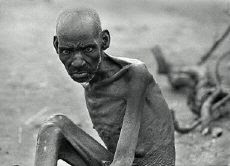Ben Block
May 28, 2009 2:53 PM
Five years ago, the rains disappeared for a month across much of
Malawi, just as the country's corn crop reached a critical growth
period. As a result, the 2005 harvest was the worst in a decade. Yet
again, millions of farmers were in need of food aid.
President Bingu wa Mutharika decided the next year would be
different. Despite World Bank disapproval and intense government
debate, Malawi's National Assembly distributed 3.4 million coupons to
farmers to subsidize purchases of inorganic fertilizer and improved
seeds. To ensure that the US$58 million program would support small
producers rather than large commercial estates, households were limited
to receiving two 50-kilogram fertilizer bags each.
With the help of heavy rains, the 2005-2006 season resulted in a
twofold increase in corn production. The program was repeated the next
year. By late 2007, Malawi began exporting its surplus corn to
Zimbabwe.
"For four years in a row, a starving country is no longer a starving
country," said Pedro Sanchez, an advisor to the Malawian government who
directs the Tropical Agriculture and the Rural Environment Program at Columbia University's Earth Institute.
A dozen countries throughout Africa may soon replicate the "Malawi Miracle," as the program is now called, Sanchez said during a speech at the American Institute of Biological Sciences (AIBS) annual conference in Arlington, Virginia, last week.
"This is Green Revolution stuff - India, Pakistan in the ‘60s," said
Sanchez, the 2002 recipient of the internationally recognized World Food Prize. "I don't know any other options that are working."
Zambia, Ghana, Senegal, and Kenya have recently announced plans for similar subsidy programs.
Still, such top-down reforms may fail, experts warn, without
improvements in the countries' commodity markets and transportation
infrastructure. Environmentalists are also concerned that the programs
may lead to farmer dependencies on synthetic fertilizer and genetically
modified seeds.
International donors such as the World Bank and U.S. Agency for
International Development originally opposed direct subsidy programs,
arguing instead for long-term solutions that rely on the private
sector.
"Donors want to see their funding going into investments on roads or research, not paying for income or salaries," said Samuel Benin, a research fellow with the Washington, D.C.-based International Food Policy Research Institute.
But since Malawi's agricultural reforms, the World Bank and other
international financial institutions have increased investments in
agriculture, including public spending initiatives.
"The private sector cannot do it all. It cannot reach farmers
everywhere because [private companies] are looking to make a profit,"
Benin said. "Donors have always known that supporting farmers is a good
thing. It's just the channel of how to do it that has been difficult."
Support for direct subsidies in countries such as Malawi and
Mozambique is also driven by concern that fertilizer prices will rise
in the future. During last summer's jump in energy prices, urea, the
world's most common nitrogen fertilizer, doubled in cost. Diammonium
phosphate (DAP), often produced using natural gas, increased by nearly
five times, according to the International Center for Soil Fertility and Agricultural Development (IFDC).
Public spending initiatives have not always found success in Africa.
In Ethiopia, government subsidies for fertilizers and improved seeds
helped increase corn production dramatically in 2001, but the country
lacked the infrastructure to distribute the harvest to remote
communities, leading to a crop surplus and a crash in prices.
"Without investing in complementary services, [the program] actually
did not help by investing in fertilizer and seeds," Benin said. "You
need good agricultural systems to move foods to less-developed areas
and connect with other markets. By not investing in other areas, that
was a failure."
Replicating the "Malawi Miracle" may bring additional problems that
have become associated with agricultural success in both developing and
developed countries. Agricultural subsidies have resulted in greater
crop yields, but farms have often become reliant on fossil fuel-based fertilizers, chemical pesticides, and irrigation in areas often prone to drought, critics say.
Reliance on genetically modified seeds can also threaten the
availability of locally adapted seed varieties for future generations.
About 700 local crops were once cultivated worldwide, enabling
communities to turn to drought-resistant crops during droughts or other
seed varities that can withstand severe weather conditions. Yet 15
crops now supply an estimated 90 percent of the world's food, said
Louise Jackson, a soil scientist at the University of California at Davis and a co-chair of the DIVERSITAS network on agro-biodiversity.
"The reality is that in many places of the world, local people are
no longer reliant on local [crop] varieties," Jackson said at last
week's AIBS conference.
Organizations such as the United Nations and the Alliance for a Green Revolution in Africa
are attempting to increase agricultural yields through systems that do
not rely entirely on synthetic fertilizers and pesticides.
Sanchez said that Malawi is attempting to use nitrogen-fixing trees or other organic methods, but the financing of organic or ecosystem-based agriculture alternatives simply do not exist in much of sub-Saharan Africa.
"We know very well that continuing to use mineral fertilizers
without organic fertilizers is wrong," Sanchez said. "I would hope to
see that in 10 years or so, a lot of fertilizers are organically fixed
through cover crops or other means."
Resource-depletion is a main reason why soils across sub-Saharan
Africa yield an average of 1 ton per hectare, compared to 3 tons per
hectare in Latin America, Southeast Asia, and the Middle East.
Beyond Malawi, a handful of other African countries have also found
recent agricultural success. The goal of 6 percent annual agricultural
growth by 2015, set by the Comprehensive Africa Agriculture Development Programme (CAADP), has been achieved by Ethiopia, Mali, Mozambique, Nigeria, Senegal, and The Gambia in recent years.
Related posts in the Worldchanging archive:
GMO Crops and the Developing World
Conservation Agriculture and Global Warming
Worldchanging Interview: Wangari Maathai
A Truly African Green Revolution
Ben Block is a staff writer with the Worldwatch Institute. He can be reached at bblock@worldwatch.org.

















